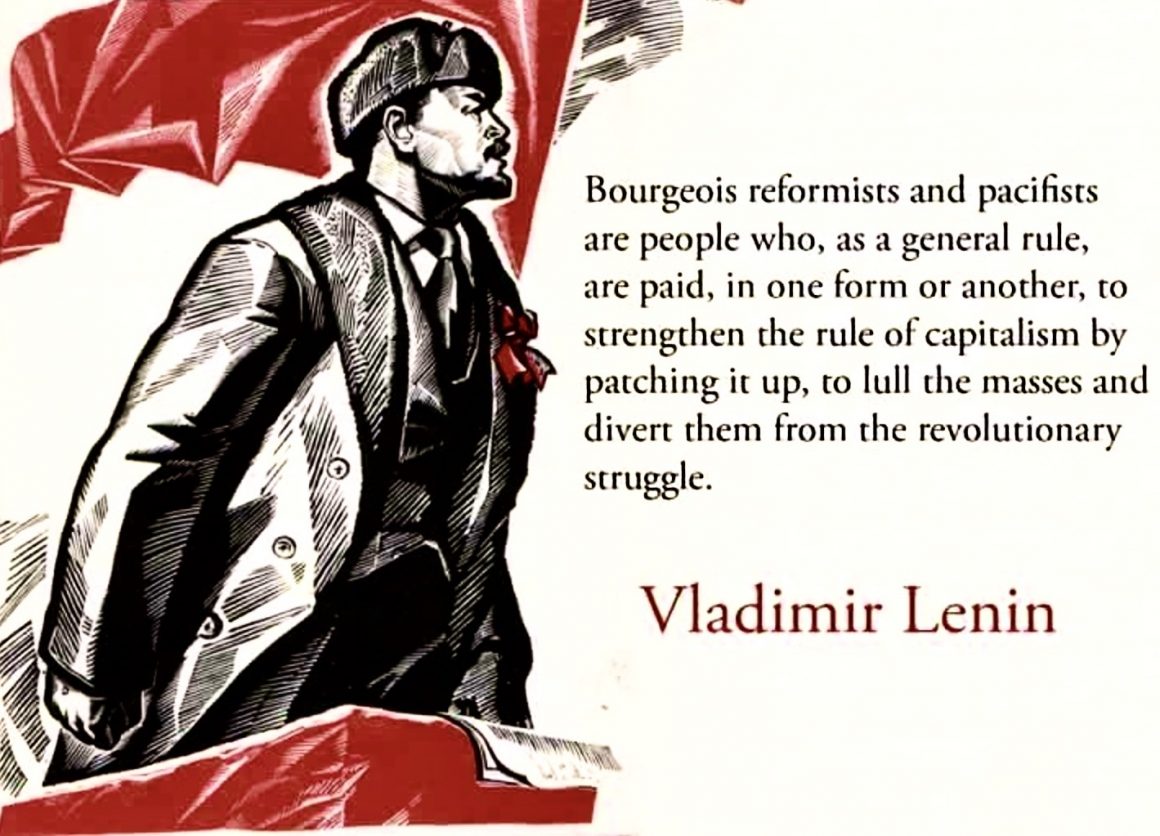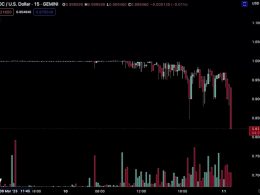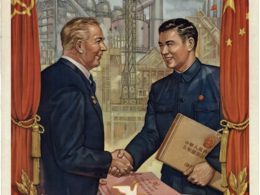The fight against NATO is a revolutionary movement. Its character is so innately radical that it’s proving impossible for liberals to co-opt, as you can’t transform an effort to destroy U.S. imperialism’s crucial tool into something sanitized and safe. It’s a threat towards the ruling class, a threat that can at this point only be truly fought through direct repression. Which is what the RESTRICT Act, and the recent DOJ indictments against black communists for “Russian interference,” are about advancing. This persecution campaign is a reaction to the weakening of the Democratic Party, and of COINTELPRO, as instruments for suppressing revolutionary politics. With the rise of the movement to end the Ukraine proxy war, these tools for counterinsurgency are becoming less useful, and must increasingly be replaced with undisguised war against our rights to speak and assemble.
This is why from a perspective of developing the class struggle, the coming of this new era of repression is encouraging. It shows that as inequalities and imperial decline have gotten more severe throughout recent years, we revolutionaries have succeeded at making the proletarian movement more and more of a threat. We’ve been successful enough that the capitalist state now sees it as necessary to sacrifice its “democratic” pretexts, in the hope that this will be sufficient for defeating us.
The post-modernist thought that the Democratic Party uses to keep its grip over the left
The way we’ve succeeded to this extent is by largely breaking from the influence of the Democratic Party. And the way we’ll keep up this series of victories is by taking our rejection of the party even further, by becoming more radical in our opposition towards the imperial order.
The way that much of the working class movement in America initially freed itself from the Democrats was by abandoning its strategic alliance with them. The Bernie Sanders movement brought in a great mass of proletarians into politics, then presented them with a choice: work within the Democratic Party, or explore alternatives. As we saw the DNC rig the primary, then Sanders endorse Clinton, then the “democratic socialist” movement’s newer representatives like AOC prove themselves to be reformists and opportunists, those among us with principles had to stop following Sanders and the anti-revolutionary parts of his ideas. Many of us joined the communist movement, which itself has a myriad of paths to choose from. Paths that, in our post-Soviet age where liberalism has gained such an insidious grip over activist spaces, don’t all lead towards revolution. Even if they come with the “communist” label.
Even prior to the USSR’s dissolution, and the destructive impact this event had on America’s own communist movement, any serious workers movement had been replaced by a version of the “left” that’s compatible with imperialism. After McCarthyism overwhelmingly wiped out communism, Herbert Marcuse and his CIA-tied Frankfurt School propagated a distorted new version of “socialism.” One based not in genuine class struggle, but in the ruling class-compatible ideas which make up the “New Left.” The destruction of the Black Panther Party ensured that communism wouldn’t become mainstream again for a long time. And when the USSR fell, those in the United States who claimed to be Marxists but who shared Gorbachev’s class collaborationist impulses deradicalized their own section of the struggle. Angela Davis, and other leaders who had been informed by Marcuse, created a new CPUSA splinter group that rejected the “authoritarian” socialist model. By default, this reformist element became the new dominant mode of “communism” in the United States.
The legacy of this American equivalent of Perestroika has been what Gabriel Rockhill calls the “global theory industry.” A business where public intellectuals like Slavoj Zizek build careers by selling “theory” that’s based not in proven realities about the workings of class conflict, but in loose, post-modern analyses which conceal how to actually bring change. In Theodor Adorno, one of the Frankfurt School’s original social science scholars, Rockhill identifies the class origins of this impulse to merely analyze capitalism’s contradictions rather than take the practical steps towards rectifying those problems:
Adorno’s fierce rejection of actually existing socialism was also on full display in his exchange with Alfred Sohn-Rethel. The latter asked him if Negative Dialectics had anything to say about changing the world, and if the Chinese Cultural Revolution was part of the ‘affirmative tradition’ he condemned. Adorno replied that he rejected the “moral pressure” from “official Marxism” to put philosophy into practice. “Nothing but despair can save us,” he asserted with his signature panache of petty-bourgeois melancholia. Adding, for good measure, that the events in communist China were no cause for hope, he explained with memorable insistence that his entire thinking life had been resolutely pitted against this form—and presumably others—of socialism: “I would have to deny everything I have thought my whole life long if I were to admit to feeling anything but horror at the sight of it.” Adorno’s open indulgence in despair and simultaneous abhorrence of actually existing socialism are not simply idiosyncratic, personal reactions but are affects arising from a class position.
“The representatives of the modern labor movement,” Lenin wrote in 1910, “find that they have plenty to protest against but nothing to despair about.” In a description that anticipated Adorno’s petty-bourgeois gloom, the leader of the world’s first successful socialist revolution then proceeded to explain that “despair is typical of those who do not understand the causes of evil, see no way out, and are incapable of struggle.”
The version of “radicalism” that maintains post-modernism’s dominance
What the three-letter agencies did by cultivating the New Left was combine this petty-bourgeois infantile disorder of discontent that lacks serious action plans, with the elevated passion of radicalism. Thereby came the rise of petty-bourgeois radicalism. The consequence of petty-bourgeois radicalism’s domination over “left” organizing and discourse spaces has been a consistent lack of a serious threat towards the capitalist state, even as this state has intensified its siege upon the working class.
The most common manifestations of petty-bourgeois radical thinking throughout this era are well-known among Marxists: insistence on voting blue as the Democratic Party grows more brazenly pro-imperialist every election cycle; continued vilification of existing socialism that makes use of modern psyops like the Uyghur genocide hoax; sectarian attacks against “Stalinists” or “Dengists” that do nothing besides feed an insular toxic discourse. In the post-Operation Z era, new manifestations of this thinking have appeared. To seize today’s opportunity for escalating the class conflict, serious Marxists must be aware of these ideological threats.
The most obvious type of this thinking, the one that’s been easiest for serious Marxists to reject, is the reinforcement of pro-NATO narratives. The efforts to minimize the Nazi policies and ideology of Ukraine’s government, deny the 2014 U.S. coup within the country, and obscure Operation Z’s humanitarian nature are intuitive things for properly informed Marxists to combat. Yet there still isn’t a consensus among self-described Marxist-Leninists on the most important among these issues, which is the justifiably of Russia’s operation. Not everybody in these circles recognizes Z’s anti-fascist nature, and in many cases, that’s not because they’re simply under-informed about historical context like the Donbass shelling. It often has to do with a particular type of framework that these individuals have for analyzing our own conditions. A framework which maintains the Democratic Party’s insidious influence over our movement.
This is the idea set that says only the left is worth trying to build a party base off of. It’s a dogma that goes against Lenin’s call to go “lower and deeper” into the people to find the most advanced among them, but that doesn’t dissuade the dogma’s adherents. This is because they view leftists as synonymous with the most advanced elements. That you can find many “leftists” who are in effect imperialist agents, and who’ve shifted closer towards the neocon stance since Russiagate, is ignored within this framework. As is the increased compatibility with the anti-imperialist movement that’s been emerging among libertarian-leaning conservatives throughout the new cold war. If somebody isn’t on the left, they’re automatically considered less valuable than those who identify as leftists, even as “the left” is showing itself not to be reliable on anti-imperialism or even on class struggle.
This is how the Democratic Party maintains its ability to co-opt liberation struggles during this stage in capitalism’s crisis, even as the social base for our socioeconomic system has dwindled. As long as the communist movement is primarily guided by a thinking that considers appealing to liberals more important than taking a principled anti-imperialist stance, the Democrats won’t see a serious challenge from the communists. Only an effort by the communists to tail them.
Trying to replace anti-imperialism & class struggle with a compatible version of “anti-colonialism”
Informing this opportunistic kind of practice is a deeper idea. An idea that the New Left and its Frankfurt School theoreticians created to divert radicals away from becoming truly offensive towards the ruling class. This root concept behind today’s anti-imperialist deficiency within the left is articulated by Laine Sheldon-Houle, who’s coming from a Trotskyist perspective yet is able to diagnose a profound theoretical failure by the representatives of our liberation struggles:
The defeat of revolutionary movements in the 1970s allowed the pendulum to swing to the right and ushered in the era of Reagan and Thatcher. The left was ideologically in a state of retreat. In this period, postcolonialism and intellectuals like Edward Said grew more and more influential. Postcolonialism is an offshoot of postmodernism which places an enormous amount of emphasis on subjectivity, arguing that all knowledge is subjective. Postcolonial intellectuals were heavily influenced by the subjectivity of postmodernism and used those methods to write about the culture and psychology of colonized people as a group, often pitted against the colonizers, settlers or simply white people. For example, Said writes: “For any European during the 19th century {in what he could say about the orient} was consequently a racist and imperialist and almost totally ethnocentric.” Painting an entire continent as “ethnocentric” with one brush! The infiltration of postmodernism into the anti-imperialist struggle detracted from the class struggle, from the disobedience, strikes and revolutions which had won independence and real concessions in the past, and demanded that all effort be placed on a cultural, psychological or even a linguistic struggle against imperialism.
There’s a difference between “post-colonial” thinkers like Said, who are merely on the broad left, and Marxist fighters against colonial thought like Fanon. The latter of whom is nonetheless often cited by the “Marxist” propagators of radical liberalism, despite their own thinking being closer to the post-modernist academic orthodoxy than to what Fanon actually believed. As Palestine advocate Bashir Abu-Manneh has observed, favored academic sources on colonialism like Said have sought to erase the Marxist-Leninist essence of Fanon:
Ignoring Fanon’s socialist commitments is also evident in Edward Said’s reading of him in Culture and Imperialism, which is historically sparked by the First Intifada and Said’s critical disenchantment with Palestinian elite nationalism. If Said is profoundly engaged with Fanon’s politics of decolonization and universalist humanism, he nonetheless fails to even mention the word “socialism” in association with Fanon, let alone read him as part of the long tradition of the socialist critique of imperialism. This dominant postcolonial disavowal of socialist Fanon is also articulated by Robert J. C. Young when he bluntly states that Fanon is not interested in “the ideas of human equality and justice embodied in socialism.” (Young subscribes to Bhabha’s reading of Fanon’s colonized as responding through violence to the psychic drama of an identity split by power. Young calls this “the theoretical problem” for Fanon.)
The petty-bourgeois radicals who claim that Fanon’s theory vindicates their anti-Marxist stances—like that the interests of white workers are fundamentally opposed to the interests of nonwhites, or that America’s proletariat overall represents a labor aristocracy—are merely the radical wing of these distorters of Fanon. There’s a reason why you don’t find emphasis on the supposed revolutionary incompatibility of white proletarians within Fanon’s works, or on the notion that American and European proletarians are all labor aristocrats. It’s because Fanon was interested not merely in posing a critical viewpoint for the sake of it, like the post-modernists are, but in critiquing colonialism and white supremacy for a concrete purpose: to advance the class struggle.
Since Fanon was serious about class struggle, he didn’t truly provide petty-bourgeois radicals with material that vindicates their anti-revolutionary ideas. Only with sound theoretical material that these radicals use to bolster their own credibility by saying they align with it, while saying many things that Fanon never said. And that have the effect of hindering his goal of furthering the proletarian movement. If Fanon were navigating today’s conditions in America, would he be one of these people who primarily emphasize the racial differences between the workers? Or would he be doing what’s consistent with his Marxist-Leninist principles, and working to unite the proletariat? The latter option is compatible with his anti-colonial ideas. One can hold these ideas, while utilizing the practice that’s best for winning power under our conditions.
By co-opting not just Fanon, but the original builders of socialism like Lenin and Stalin, these actors who fall within Parenti’s “anything but class” designation are gatekeeping the ideas we need to become more effective revolutionaries. The Democratic Party’s grip over the communist movement is weakening, but it can only be fully ended when we’ve embraced a practice which can unite the people behind the class struggle. The backlash to the Ukraine proxy war provides an opportunity for raising revolutionary consciousness, and for mobilizing the people. It’s proving wrong the essential notion of the compatible left, which is that revolution can only be realized by mobilizing those who are already approved members of the “radical” circles. Not only is the theory that one must accept in order to be included within these circles based in post-modern anti-Marxism, but these circles are not the arenas in which society’s fate will be decided.
The true arena of power is the broad mass of the people. Who we can’t bring towards revolution without applying Lenin’s principle of raising the average worker up to the level of the ideologically trained cadre member. The opportunistic actors whose status depends on these insular “left” circles are not interested in educating the people in this way, and that shows in how their practice overwhelmingly doesn’t consist of fighting imperialism’s psyops. It almost entirely consists of reinforcing the post-modern theories that keep them popular within their fandom spaces, creating an online equivalent of those academic theory industry centers.
We can’t win power while functioning within a mode of thought that’s so detached from the people’s practical realities. The main thing that’s on the average person’s mind at the moment is the inflation crisis, and we can provide them with answers on that by drawing attention towards U.S. hegemony and its war machine. That’s the type of ideological struggle which can connect us to the working class. It’s the type of practice that can complete the Democratic Party’s downfall, make communism mainstream again, and force the state to finish its transition towards treating us as an urgent threat.
————————————————————————
If you appreciate my work, I hope you become a one-time or regular donor to my Patreon account. Like most of us, I’m feeling the economic pinch during late-stage capitalism, and I need money to keep fighting for a new system that works for all of us. Go to my Patreon here.








